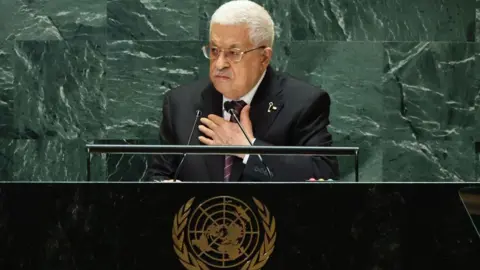Palestinian President Mahmoud Abbas has been blocked from attending the UN General Assembly session in New York next month, after he and 80 other Palestinian officials had their visas revoked, the US State Department has said.
US Secretary of State Marco Rubio blamed them for undermining peace efforts and for seeking the unilateral recognition of a conjectural Palestinian state.
The decision, welcomed by Israel, is unusual as the US is expected to facilitate travel for officials of all countries wishing to visit the UN headquarters.
The ban comes as France leads international efforts to recognise a state of Palestine at the session - a move that Donald Trump's administration has opposed.
The Palestinian ambassador to the UN, Riyad Mansour, had earlier said that, as head of its delegation, Abbas would be attending the meeting of heads of state and government.
But a State Department official later said Abbas and about 80 other Palestinians would be affected by the decision to deny and revoke visas from members of the Palestine Liberation Organization (PLO) and the Palestinian Authority (PA).
Rubio stated that representatives from the Palestinian mission in New York could still attend meetings in line with the UN Headquarters Agreement.
However, it remains unclear if this US action aligns with that agreement, which stipulates that foreign officials' attendance should not be hindered by the US regardless of the diplomatic relations in place.
Abbas' office expressed astonishment at the visa decision, deeming it a clear violation of international law and the UN Headquarters Agreement, particularly as Palestine is recognized as an observer member of the United Nations. They urged the US to reverse the decision.
Israeli Foreign Minister Gideon Saar praised the US's decision to revoke the visas.
The complex political backdrop includes ongoing tensions in the region, with Abbas's Fatah party in competition with Hamas, which governs Gaza.
Previously, in 1974, the UN recognized the PLO as the sole legitimate representative of the Palestinian people and granted it observer status, but in 2012, the General Assembly accorded Palestine the status of a non-member observer state.
Israeli Prime Minister Benjamin Netanyahu has consistently rejected the possibility of a two-state solution, branding it as a reward for terrorism by Hamas after recent conflicts.
The backdrop to this diplomatic tension includes a recent military campaign in Gaza by Israel, which has escalated the humanitarian crisis in the region.
The decision has drawn attention internationally, with countries like the UK, Canada, and Australia also considering recognition of a Palestinian state during the General Assembly meeting next month.

















